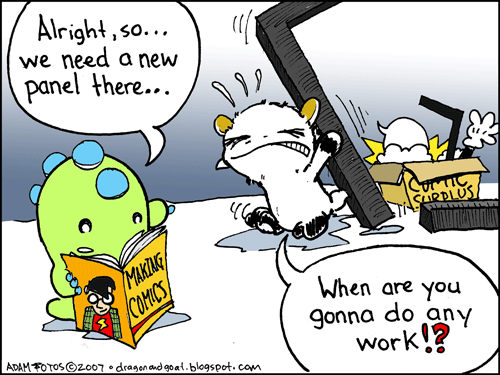Comics writer McCloud to lecture at Krannert

ME Online
April 19, 2007
Beginning last September, Scott McCloud and his family embarked on a 50-state tour to promote his latest book, “Making Comics.”
On Monday, April 23, he will be making a stop at the University.
In 1993, the comics writer, artist and theorist first championed the powerful language of comics with his book “Understanding Comics: The Invisible Art.”
McCloud’s book was not simply a text about comics with pictorial examples, but was instead written and drawn entirely in comic book format. John Jennings, an associate professor in FAA, said of McCloud, “In my opinion, Scott McCloud is one of the most important figures in visual culture and media literacy. His insight into the comics medium is second to none, and his passion and expertise will influence comic book creators for generations to come.”
With his 215-page book, McCloud decoded the language of comics in a way that was not only enjoyable and easily accessible but also had real substance.
Get The Daily Illini in your inbox!
In the first chapter, he mines the definition of comics and its limits until coming to the term “sequential art” as an all-encompassing label for the medium – a term used earlier by Will Eisner in his book “Comics and Sequential Art.”
McCloud plainly defines comics as “juxtaposed pictorial and other images in deliberate sequence, intended to convey information and/or to produce an aesthetic response in the viewer.”
With “Understanding Comics,” McCloud goes on to explore the vocabulary of comics, the use of frames, structures of time, motion and the semiotic rifts and junctures of image and text.
“‘Understanding Comics’ is all about how we read pictures with words and how we use them to tell stories. Because he knows the language of comics so well, McCloud can break it down so that you begin to see new ways to put it back together,” said Kim Purkiss, a graduate student.
Since then, McCloud’s book has become somewhat of a bible for comics artists, writers and readers.
While some of his opinions in “Understanding Comics” are highly debatable, McCloud does not claim to have all the answers but simply wants to clearly express his side and keep the discussions going.
His next book, “Reinventing Comics,” drew much more criticism as McCloud mapped out the direction he thought that comics needed to take and this direction was largely out of print and onto the Web.
McCloud sees the paperless, online comic as a freer form that would open many more doors for comic writers and artists. Though it received praise especially from the gaming and graphic interface-designing worlds, McCloud seemed to have hit several nerves in the comics industry and, of course, received a great deal of criticism from the industry that he saw needed to change.
“Scott McCloud puts on a great show,” said Rose Marshack, the Visiting Art and Technology Integration Specialist at the Krannert Art Museum.
“He is a fantastic graphical communicator, and it’s wonderful to see a presentation given by someone who is so adept at telling stories with pictures,” she added.
McCloud will be coming to the Krannert Art Museum, 500 E. Peabody Dr., on April 23.
He will give a lecture titled “Comics Storytelling” at 6 p.m. in Room 62.
The lecture is sponsored by the Art Graduate Student Organization and the School of Arts’ Visiting Artists Series as well as SORF.
Following his lecture, McCloud will be available for a book signing.






